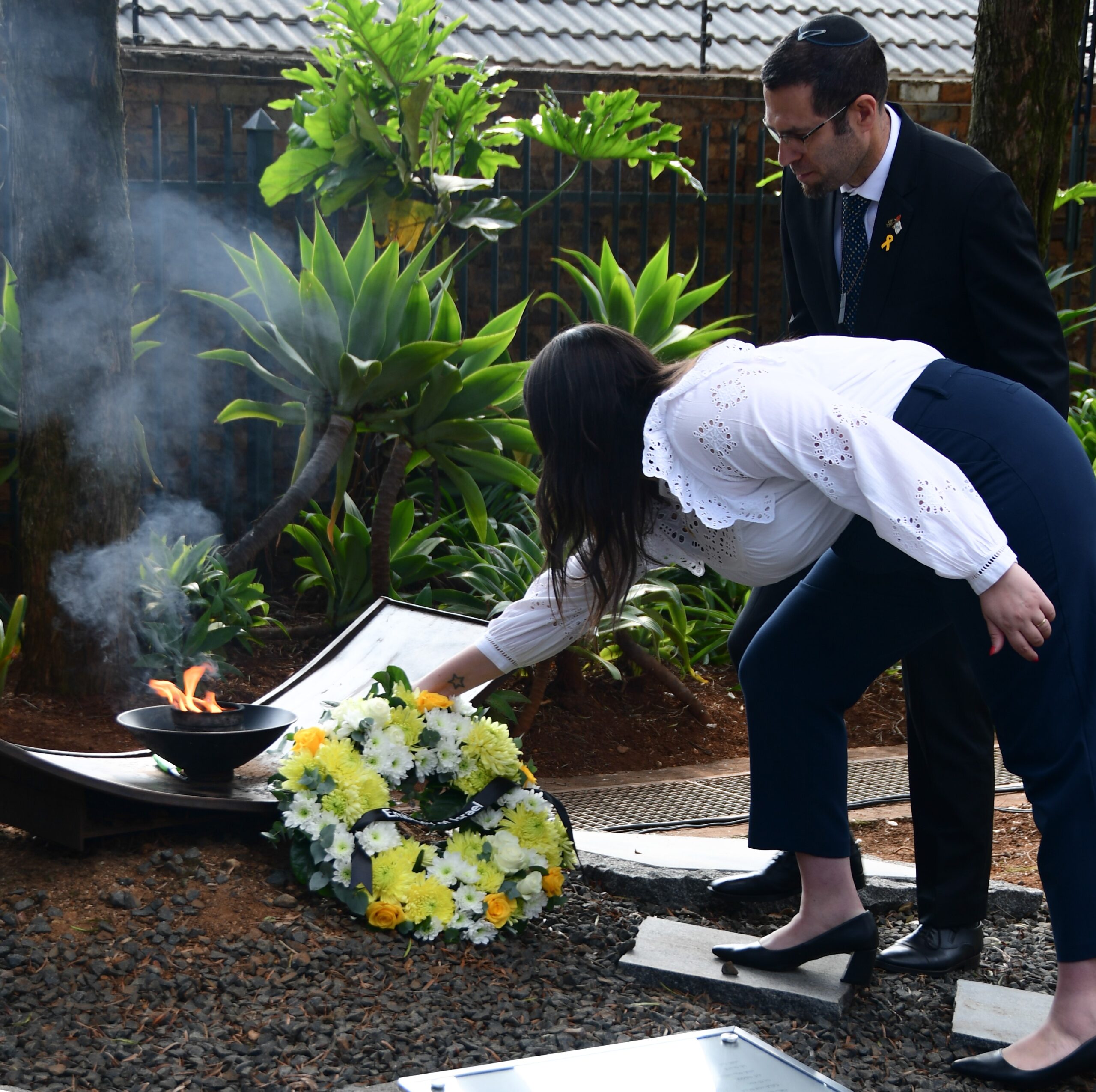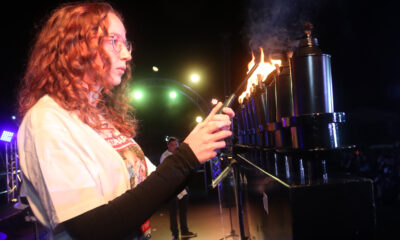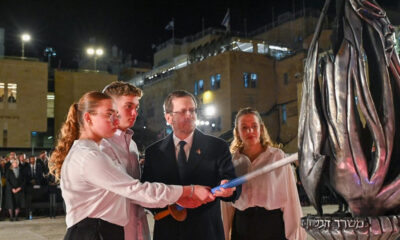
Featured Item

‘There are no lone soldiers – we’re all one family’
The post-7 October Yom Hazikaron ceremony at the Israeli embassy in Pretoria on Monday morning, 13 May, was particularly poignant, not least of all as the name Daniel Perez has now been added to the names of South Africans on the memorial cenotaph in the embassy garden.
Following the sounding of the memorial siren, lighting of the memorial lamp, and laying wreaths in the garden of remembrance, Yaakov Finkelstein, a visiting Israeli foreign affairs dignitary, said he believed there were no lone soldiers in Israel because they were simply part of the Am Yisrael (the people of Israel) family.
He told of a young Golani unit soldier, known as Nat, who was killed in the line of duty in the massacre of 7 October 2023. He was called a lone soldier because he had made aliya, leaving his family behind in England. Nat was Finkelstein’s daughter, Naomi’s, good friend and she was devasted by his loss. “My daughter and I were worried that not enough people would be there at his funeral because he had been in Israel only for a short time, but we were wrong. There were hundreds of people there for him, and so many weren’t even able to get close to the grave on Mount Herzl. They may not have known Nat, but they all wanted to show their support for this “lone soldier” who gave his life for his people,” said Finkelstein.
He recalled seeing a big burly “thuggish-looking man” coming forward to the grave, and he discovered that he was the father of the soldier whose funeral was next. “The man’s son was in Nat’s army unit, and he wanted to pay his respects to this hero, or “tzaddik” as he called him, who wasn’t obliged to lay down his life for Israel. This father was the one who made the point that there are no lone soldiers in Israel as they aren’t alone, they are a part of us. This is the bond between Israel and Jews around the world. It’s a covenant of the blood we share.”
And, said Finkelstein, now we have to add Daniel Perez, whose family lived in South Africa, to the memorial in the embassy garden.
However, in the words of Daniel’s father, South African-born Rabbi Doron Perez, the chairperson of the Mizrachi World Movement, “Bitterness ought never define us.” These words were heard at the Yom Hazikaron event on Monday morning when the eulogy Perez gave at Daniel’s funeral in March this year was read by Rabbi Daniel Kaplan.
“The challenge, pain, and blood are all part of our story, but they are not the story itself. The story is one of resilience and redemption, of freedom and destiny,” he said.
Kaplan continued, “We know that the power of life which we so deeply believe in will ultimately triumph over those who celebrate death.”
Captain Daniel Perez, who grew up in Johannesburg, was killed on 7 October, but for 163 days, was believed to have been taken hostage. His family didn’t have his body to bury as it’s still in Gaza, taken on that fateful day. “The blood-stained shirt of your army uniform with your rank and blood found in and around your tank was all we were able to bury,” said Rabbi Perez at the funeral.
They buried his blood in a decision to “salute” him, to honour him, and, the rabbi said, to “bow our head to you and appreciate your self-sacrifice and courage”. In his eulogy, the rabbi told how former Prime Minister Naftali Bennett had told the mourning family that Daniel’s two-hour battle “was among the most heroic he had heard of”. He went on to say that Daniel had “saved people in the Nachal Oz army base and Nachal Oz kibbutz”.
“It’s possible you saved not only generations of people you don’t know, but perhaps even the life of your brother, Yonatan,” the rabbi said. “After all, Yonatan also fought later that day in Nachal Oz and was injured 100 yards [91m] from where you were taken. Had you not done what you did, who knows how many more terrorists may have ambushed Yonatan in the base that day.”
In the eulogy, Perez appealed to the Israeli government to do all it can to return all those who had fallen in the war against Hamas, and those of the 132 still being held hostage in Gaza. “To an extent, all of us are still trapped there, for we’re one nation. We’re not a weak society, but one built with bonds of love, mutual responsibility, swords of iron – the bonds of a blood covenant. This isn’t weakness, this is strength.”
In this war alone, 650 soldiers have fallen, and 1 200 Israelis were killed on 7 October alone. As many as 2 540 people have died just for the sake of wanting to live in the Jewish homeland. The loss was felt by all around the world as well as at the embassy this week.
However, as Yair Lapid wrote in a poem titled It is not true that life goes on recited at the ceremony, there’s no getting back to normal after this kind of loss of loved ones. It’s not true that life goes on as it had been before your loss, he said. “When you lose someone that close, your life as you know it has ended. It ends and it begins again. Differently.”










